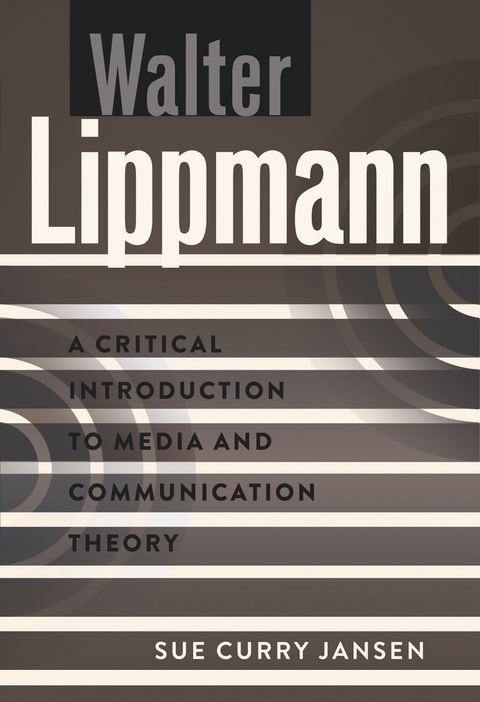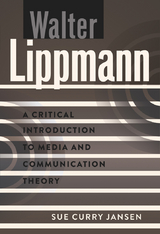Walter Lippmann
A Critical Introduction to Media and Communication Theory
Seiten
2012
|
New edition
Peter Lang Publishing Inc (Verlag)
978-1-4331-1136-5 (ISBN)
Peter Lang Publishing Inc (Verlag)
978-1-4331-1136-5 (ISBN)
The study of the media in the field of communication suffers from no shortage of theoretical perspectives from which to analyze media, messages, media systems, and audiences.
This series highlights the individuals and ideas whose importance to the study of communication can be reconfigured, reinvented, and refocused.
Walter Lippmann has been widely misrepresented in media and communication scholarship. Classified as a utilitarian and characterized as an antidemocratic adversary of philosopher John Dewey in a legendary debate in the 1920s about the role of the public in modern democracies, Lippmann has been portrayed as the bête noir of the post-1980s revival of pragmatism and humanistic studies within the field. Consequently, his formative contributions to the field have not only been under-valued, but more importantly, the richness and continuing relevance of his generative work to the challenges of the twenty-first century are largely under-appreciated.
There are, however, some recent signs of the beginnings of a Lippmann renaissance. Focusing primarily on his early career when Lippmann directly addressed the challenges posed to democracy by the emergence of new communication technologies, this book is part of that renaissance. It presents a radical reconsideration of Lippmann’s thought and legacy and offers a broad-based introduction to his theories of mass communication.
Arguing that he was a political ally rather than an adversary of Dewey as well as a humanist and a democrat, influenced by William James’ pragmatism and George Santayana’s critical realism, Jansen contends that Lippmann developed a fully formed social constructivism decades before Peter L. Berger and Thomas Luckman’s seminal 1966 treatise, The Social Construction of Reality. She boldly concludes that Lippmann deserves to be recognized as a founder of the field of media and communication research.
This series highlights the individuals and ideas whose importance to the study of communication can be reconfigured, reinvented, and refocused.
Walter Lippmann has been widely misrepresented in media and communication scholarship. Classified as a utilitarian and characterized as an antidemocratic adversary of philosopher John Dewey in a legendary debate in the 1920s about the role of the public in modern democracies, Lippmann has been portrayed as the bête noir of the post-1980s revival of pragmatism and humanistic studies within the field. Consequently, his formative contributions to the field have not only been under-valued, but more importantly, the richness and continuing relevance of his generative work to the challenges of the twenty-first century are largely under-appreciated.
There are, however, some recent signs of the beginnings of a Lippmann renaissance. Focusing primarily on his early career when Lippmann directly addressed the challenges posed to democracy by the emergence of new communication technologies, this book is part of that renaissance. It presents a radical reconsideration of Lippmann’s thought and legacy and offers a broad-based introduction to his theories of mass communication.
Arguing that he was a political ally rather than an adversary of Dewey as well as a humanist and a democrat, influenced by William James’ pragmatism and George Santayana’s critical realism, Jansen contends that Lippmann developed a fully formed social constructivism decades before Peter L. Berger and Thomas Luckman’s seminal 1966 treatise, The Social Construction of Reality. She boldly concludes that Lippmann deserves to be recognized as a founder of the field of media and communication research.
Sue Curry Jansen holds a PhD in sociology from the University at Buffalo (SUNY). She is Professor of Media and Communication at Muhlenberg College in Allentown, PA. She is the author of Censorship: The Knot that Binds Power and Knowledge (1991); Critical Communication Theory: Power, Media, Gender, and Technology (2002); and co-editor, with Jefferson Pooley and Lora Taub-Pervizpour, of Media and Social Justice (2011).
| Reihe/Serie | A Critical Introduction to Media and Communication Theory ; 5 | A Critical Introduction to Media and Communication Theory ; 5 |
|---|---|
| Mitarbeit |
Herausgeber (Serie): David W. Park |
| Verlagsort | New York |
| Sprache | englisch |
| Maße | 150 x 225 mm |
| Gewicht | 270 g |
| Themenwelt | Geisteswissenschaften ► Sprach- / Literaturwissenschaft ► Literaturwissenschaft |
| Sozialwissenschaften ► Kommunikation / Medien ► Journalistik | |
| Sozialwissenschaften ► Kommunikation / Medien ► Kommunikationswissenschaft | |
| Sozialwissenschaften ► Kommunikation / Medien ► Medienwissenschaft | |
| Sozialwissenschaften ► Politik / Verwaltung ► Politische Theorie | |
| Sozialwissenschaften ► Soziologie ► Allgemeines / Lexika | |
| Sozialwissenschaften ► Soziologie ► Allgemeine Soziologie | |
| ISBN-10 | 1-4331-1136-5 / 1433111365 |
| ISBN-13 | 978-1-4331-1136-5 / 9781433111365 |
| Zustand | Neuware |
| Haben Sie eine Frage zum Produkt? |
Mehr entdecken
aus dem Bereich
aus dem Bereich
Buch | Softcover (2020)
Beuth (Verlag)
CHF 27,85




